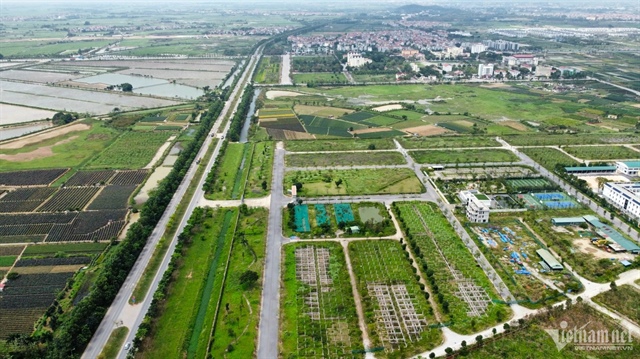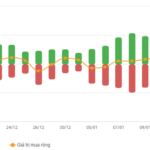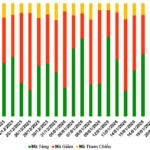The Vietnam Valuation Association proposed the following in their feedback on the draft amendment and supplementation of several articles of the 2024 Land Law:
The Association recommended retaining the content of Articles 158, 159, 160, and 162 under Section 2 on Land Prices of the current Land Law. They suggested reviewing and amending only the specific guidelines issued by the government to better meet the practical demands that have arisen since the law’s enactment.
The proposed retention of these articles includes determining land prices based on market principles and regulations on specific land prices. These provisions were initially excluded from the draft amendment of the 2024 Land Law.
However, according to the Association, the current regulations meet three critical requirements. First, they align with the theory of land pricing and the guidelines set by the International Valuation Standards Council, of which the Vietnamese valuation industry is a member.
Additionally, the content of the Law has proven compatible with the practical conditions of Vietnam’s current land market. Moreover, the existing regulations adhere to the directives of the Political Bureau in Resolutions 18-NQ/TW and 69-NQ/TW.
The Vietnam Valuation Association further emphasized the need to consistently apply the principle of state-determined land prices based on market mechanisms. They argued that when land use rights are treated as a commodity, their operation must follow market economy principles.
“Land prices reflect and synthesize significant economic and social relationships within the economy. They are considered a ‘mirror’ of the land market, accurately reflecting the nature of that market,” stated the Vietnam Valuation Association.

Recommending more reasonable preferential policies to prevent “shocks” that negatively affect people’s lives when determining land prices based on market principles. Photo: Hong Khanh |
Therefore, the agency argued that land valuation cannot rely on distorted market signals or be influenced by singular, abnormal, and unreasonable factors such as speculation, price manipulation, economic and financial crises, and irrational market barriers.
Instead, the market requires regulation to eliminate these factors, such as adjusting supply and demand and financial and monetary policies.
The Association also noted that determining land prices based on market principles would significantly impact the accessibility of land for various societal segments, especially regarding welfare policies.
“These are real impacts if there are no policies to mitigate them,” the Association emphasized. Consequently, they proposed that the Law and its guiding documents should incorporate flexible financial policies, particularly regarding taxes and other revenues. For instance, when market land prices are already high, the state’s collection ratio should be adjusted downward.
In addition, more reasonable preferential policies are necessary to prevent “shocks” that negatively affect people’s lives.
To effectively apply market principles, the Association recommended that the state review and supplement the existing regulations to provide specific criteria for valuation organizations to select input data for commonly used valuation methods.
Furthermore, the Association suggested retaining the regulation on specific land prices. They argued that the land price list and adjustment coefficients are inherently batch valuation methods and cannot encompass specific cases based on market price principles. This would also impact the financial policies between the state and land-using organizations and individuals.
The Association believed that specific decisions are still necessary for certain cases. These include unused land being used for the first time, land with unique characteristics (reclaimed land) not included in the land price list, and projects with the same land use purpose but differing in scale, functionality, land use structure, and land use coefficient.
Objective and reasonable fluctuations that locally impact market prices, as well as specific types of land and projects at the time of land allocation or revocation for implementing policies on land use fees, land rent, and site clearance compensation, are also suitable cases for applying specific land prices.
Hong Khanh
“Debunking Rumors: Danang Authorities Refute Land Price Surge Claims”
The Danang Department of Natural Resources and Environment has clarified that land prices have not increased tenfold, but rather have been adjusted within the prescribed scope. They assert that the claims made by residents are inaccurate and that any changes are in line with the relevant regulations.
Dr. Vu Dinh Anh: Land Valuation Must Follow Market Mechanisms
“The notion of ‘land valuation close to market price’ is problematic, according to Dr. Vu Dinh Anh. He argues that adhering to this perspective will never fundamentally resolve the issue. Instead, he proposes embracing the principle of ‘land valuation adhering to market mechanisms’ and emphasizes the imperative of establishing an impartial, transparent, and professional land valuation market.”
Unlocking Affordable Housing Opportunities: Businesses Urge Amendments to the Land Law
The upcoming 2024 Land Law amendments aim to strike a delicate balance in land-related financial obligations and address the concerns arising from the steep rise in land prices over the past year. While businesses continue to grapple with the challenge of input costs for housing, the state is committed to curbing budget deficits and fostering a harmonious relationship between the state, businesses, and citizens.




















